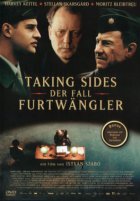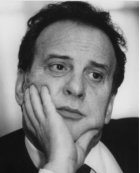
Taking Sides Page #5
- NOT RATED
- Year:
- 2001
- 108 min
- 526 Views
SCHLEE:
allowed it. My brother was married
to a Jewess, may she rest in peace.
And Goebbels said...
(to Emmi)
...please take this down carefully,
because it's most important,
Fraulein?
EMMI:
Straube.
SCHLEE:
(acting surprised)
Straube? Are you by any chance
related to Colonel Joachim Straube?
EMMI:
My father.
SCHLEE:
He was... he was a great hero.
Steve lights a cigarette.
SCHLEE:
Goebbels, yes, Josef Goebbels said,
'There's not a single filthy Jew
left in Germany on whose behalf
Dr. Furtwängler has not intervened.'
No, no one could have been less of
a Nazi than Dr. Furtwängler.
STEVE:
But this was the same guy who
conducted for Adolf on his birthday.
SCHLEE:
He was forced to do that. But he
refused to give the Nazi salute in
front of Hitler. He kept his baton
in his hand, you can't salute with
a baton in your hand.
DAVID:
And what about the Nuremberg Rally?
SCHLEE:
No, we...we played on the evening
before the Rally.
STEVE:
(straight-faced)
Oh! The evening before, I see...
SCHLEE:
Yes, Dr. Furtwängler was absolutely
clear about this: politics and art
must be kept separate.
STEVE:
Politics and art must be kept
separate. I'll remember that. But
let me see if you can help me with
something I just don't understand.
I'd really like to know why all
you guys are so crazy about him.
What's his secret?
Schlee tries to find words.
SCHLEE:
Well, it's hard to explain. I can
only tell you from my own
experience. Soon after I joined
the orchestra, we were rehearsing
the Third Symphony of Beethoven,
the Eroica. There are several rather
difficult passages for the timpani.
One particular crescendo. During
the break, I asked how he wanted
it played. He was studying his
score. He didn't look up. He said,
'Just watch me.' So, of course, I
did. I never stopped watching him.
The moment came. And suddenly, he
turned to me and our eyes were
locked. There was something in his
look that... that simply demanded
the crescendo. I shall never forget
his look. It was a moment of... of
magic.
Steve nods, thinks for a moment. Then:
STEVE:
You ever seen Adolf Hitler's eyes
when he was making a speech? I've
seen 'em on films.
SCHLEE:
Yes.
STEVE:
Was looking at Furtwängler like
that?
SCHLEE:
I don't know what you mean, Major.
STEVE:
When you got to the crescendo.
Schlee looks at him bewildered.
INT./EXT. CAR (TRAVELLING), LAKESIDE AND MANSION - DAY
In the back, David and Steve. Military driver. The car's
making its way along a road that skirts a lake towards a
grand mansion from which fly the four Allied flags.
STEVE:
You think a whole orchestra, what,
a hundred and forty or so guys,
could be orchestrated?
DAVID:
I guess it's possible.
STEVE:
So, what does the Russki want?
DAVID:
Colonel Dymshitz asked specially
to see you.
STEVE:
'Dim-shits'?
A huge, cavernous room, once the ballroom.
In the centre, a table with four chairs. To one side,
antique furniture, objets d'art, paintings. Four Allied
officers are surveying the treasures: COLONEL DYMSHITZ,
COLONEL GREEN (American), MAJOR RICHARDS (British) and
CAPTAIN VERNAY (French). What they say is barely audible,
low mumbles. They're accompanied by aides with clipboards,
taking notes.
Beyond, and some distance away, a row of gilt chairs for
observers where David and Steve take their seats.
STEVE:
What the hell are they doing?
DAVID:
(whispered)
They're trying to sort out some of
the works of art the Nazis stole
from occupied territories. Who
really owns what? That's Colonel
Dymshitz, on the far side.
Translation
Translate and read this script in other languages:
Select another language:
- - Select -
- 简体中文 (Chinese - Simplified)
- 繁體中文 (Chinese - Traditional)
- Español (Spanish)
- Esperanto (Esperanto)
- 日本語 (Japanese)
- Português (Portuguese)
- Deutsch (German)
- العربية (Arabic)
- Français (French)
- Русский (Russian)
- ಕನ್ನಡ (Kannada)
- 한국어 (Korean)
- עברית (Hebrew)
- Gaeilge (Irish)
- Українська (Ukrainian)
- اردو (Urdu)
- Magyar (Hungarian)
- मानक हिन्दी (Hindi)
- Indonesia (Indonesian)
- Italiano (Italian)
- தமிழ் (Tamil)
- Türkçe (Turkish)
- తెలుగు (Telugu)
- ภาษาไทย (Thai)
- Tiếng Việt (Vietnamese)
- Čeština (Czech)
- Polski (Polish)
- Bahasa Indonesia (Indonesian)
- Românește (Romanian)
- Nederlands (Dutch)
- Ελληνικά (Greek)
- Latinum (Latin)
- Svenska (Swedish)
- Dansk (Danish)
- Suomi (Finnish)
- فارسی (Persian)
- ייִדיש (Yiddish)
- հայերեն (Armenian)
- Norsk (Norwegian)
- English (English)
Citation
Use the citation below to add this screenplay to your bibliography:
Style:MLAChicagoAPA
"Taking Sides" Scripts.com. STANDS4 LLC, 2024. Web. 22 Dec. 2024. <https://www.scripts.com/script/taking_sides_403>.



Discuss this script with the community:
Report Comment
We're doing our best to make sure our content is useful, accurate and safe.
If by any chance you spot an inappropriate comment while navigating through our website please use this form to let us know, and we'll take care of it shortly.
Attachment
You need to be logged in to favorite.
Log In